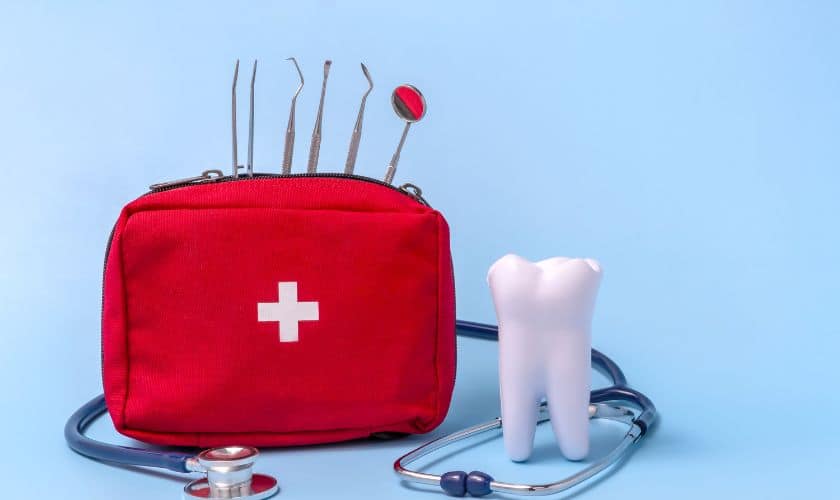Have you ever experienced a sudden toothache that just won’t go away? Or maybe you’ve accidentally knocked out a tooth while playing your favorite sport? Dental emergencies can happen to anyone, at any time, and they can be agonizing. But don’t panic – emergency dental care is available to help alleviate your pain and discomfort. In this comprehensive guide, we’ll walk you through when to seek emergency dental care, what to expect during your visit, how to prepare for it, and tips for finding a reliable emergency dentist. So sit back, relax (as much as possible with a toothache), and read on!
When to Seek Emergency Dental Care
Experiencing dental problems can be overwhelming and painful. While some issues may not require immediate attention, there are certain situations where emergency dental care is necessary.
One of the most common reasons to seek emergency dental care is a severe toothache that has lasted for more than a day or two. This could indicate an infection or abscess that requires prompt treatment to prevent further damage.
Another reason to seek emergency dental care is if you experience swelling in your gums, face, or neck as this could be a sign of an underlying issue such as an infected tooth root.
Additionally, if you suffer from trauma or injury to your mouth resulting in broken teeth, jaw pain or bleeding gums – it’s essential to get medical assistance right away.
It’s important always to listen to what your body tells you and trust your instincts when it comes to seeking medical attention. Emergencies don’t wait for regular business hours; therefore, make sure you know how and where to find reliable emergency dentists who will provide the best possible care at any time of day.
What to Expect When You Seek Emergency Dental Care
When you seek emergency dental care, it’s natural to feel anxious and unsure of what to expect. However, understanding the process can help ease your nerves and make the experience less stressful.
Upon arrival at the dentist’s office or emergency room, you will likely be asked about your symptoms and given a physical examination. X-rays may also be taken to determine the extent of any damage or decay.
Depending on your situation, treatment options may vary. Simple procedures such as filling cavities or extracting teeth can often be done on an emergency basis. More complex issues like root canals or oral surgeries may require additional appointments.
It’s important to note that emergency dental care is typically focused on relieving pain and preventing further harm rather than cosmetic concerns. You should discuss any long-term treatment plans with your regular dentist after receiving emergency care.
Seeking prompt medical attention in cases of dental emergencies can prevent complications and promote a quicker recovery time. Trusting in the expertise of trained professionals is key for managing pain and restoring oral health.
How to Prepare for Emergency Dental Care
Preparing for emergency dental care can help you stay calm and focused during a stressful situation. First, make sure you have the contact information for an emergency dentist readily available. Keep their phone number and address in your phone or written down somewhere easily accessible.
Next, gather any relevant medical information to bring with you to your appointment. This could include a list of medications you are taking or allergies you may have. It is also important to inform your emergency dentist if there has been any recent trauma or injury that led to the need for immediate dental care.
Pack a small bag with essentials such as water, pain relievers, and comfortable clothing in case you need to wait at the office before being seen by the dentist.
Mentally prepare yourself by practicing deep breathing exercises or meditation techniques prior to your appointment. Remember that seeking emergency dental care is a proactive step towards maintaining good oral health and overall well-being.
Tips for Finding a Good Emergency Dentist
When it comes to finding a good emergency dentist, there are several factors that you should consider before making your decision. First and foremost, look for a dental professional who offers emergency services outside of regular business hours. This way, you can rest assured knowing that help is available when you need it the most.
In addition to availability, consider the dentist’s experience and expertise in handling dental emergencies. You want someone who has dealt with a variety of situations and knows how to quickly and effectively address them.
It’s also important to choose an emergency dentist who accepts your insurance or offers affordable payment options. Dental emergencies can be expensive, so having financial peace of mind is crucial during these times.
Another factor to consider is location. Look for an emergency dentist located near your home or workplace so you don’t have to travel far while experiencing pain or discomfort.
Read reviews from other patients about their experiences with the emergency dentist. Positive feedback from others can give you confidence in choosing the right dental professional for your needs.
By taking these tips into consideration, you’ll be able to find a reliable and trustworthy emergency dentist who can provide essential care when unexpected oral health issues arise.
Conclusion
Emergency dental care is something that every person should take seriously. Knowing when to seek emergency dental care and being prepared for it can make a huge difference in the outcome of your dental emergency. By following the tips outlined in this comprehensive guide, you will be better equipped to handle any unexpected dental emergencies that come your way.
Remember to always stay calm and focused during a dental emergency, and do not hesitate to contact a trusted emergency dentist as soon as possible. With proper preparation and quick action, you can avoid long-term damage or discomfort caused by untreated oral health issues.

